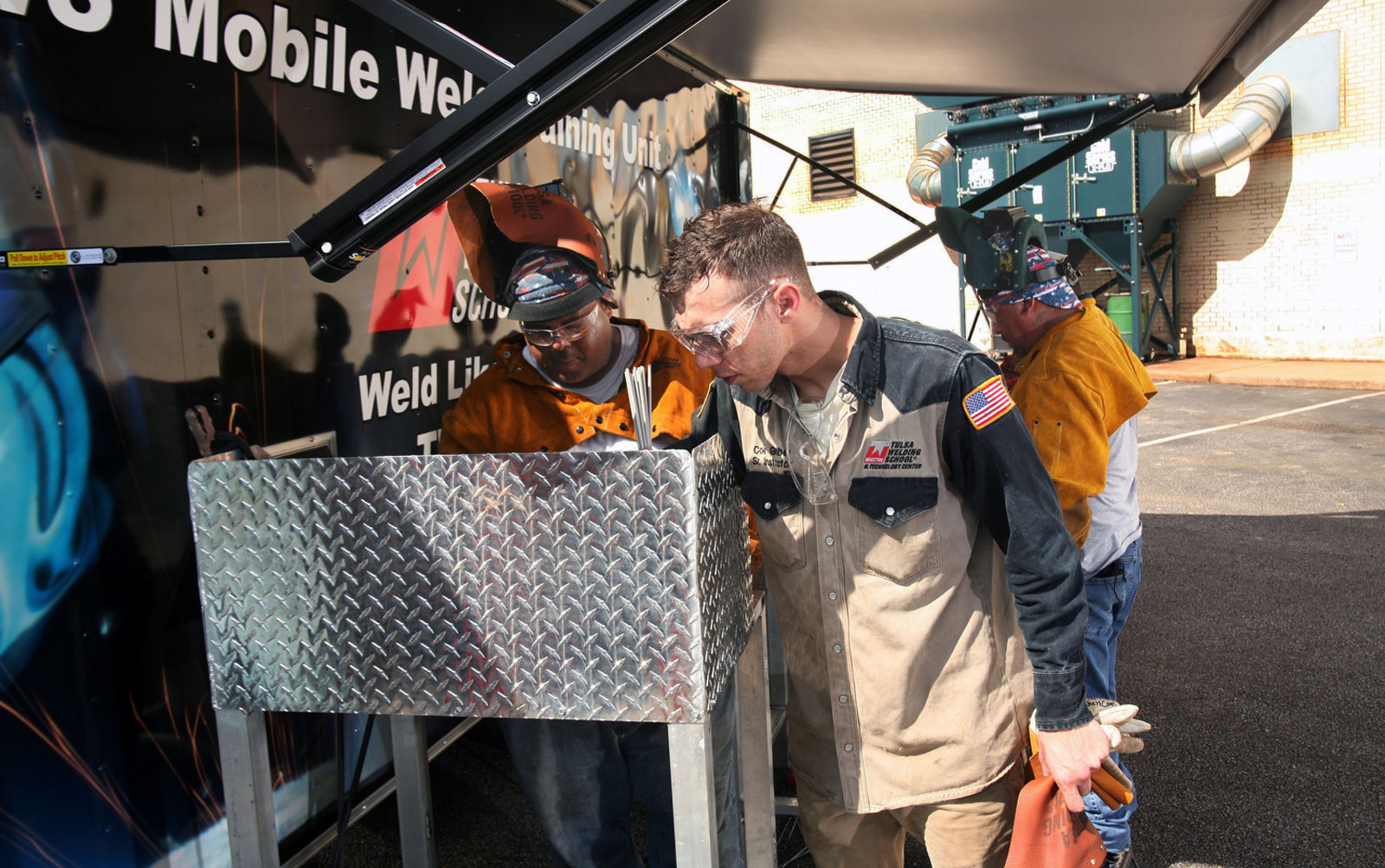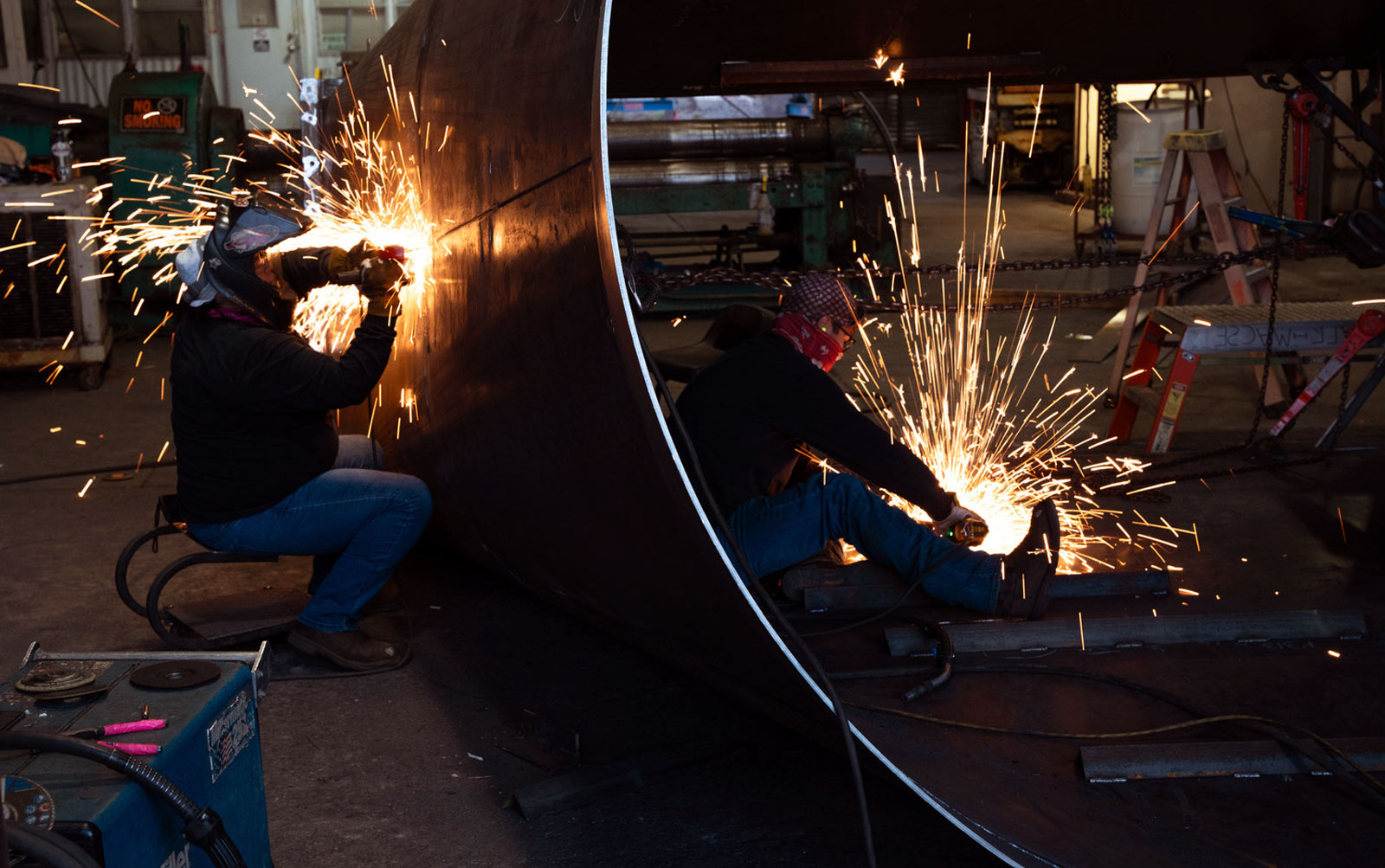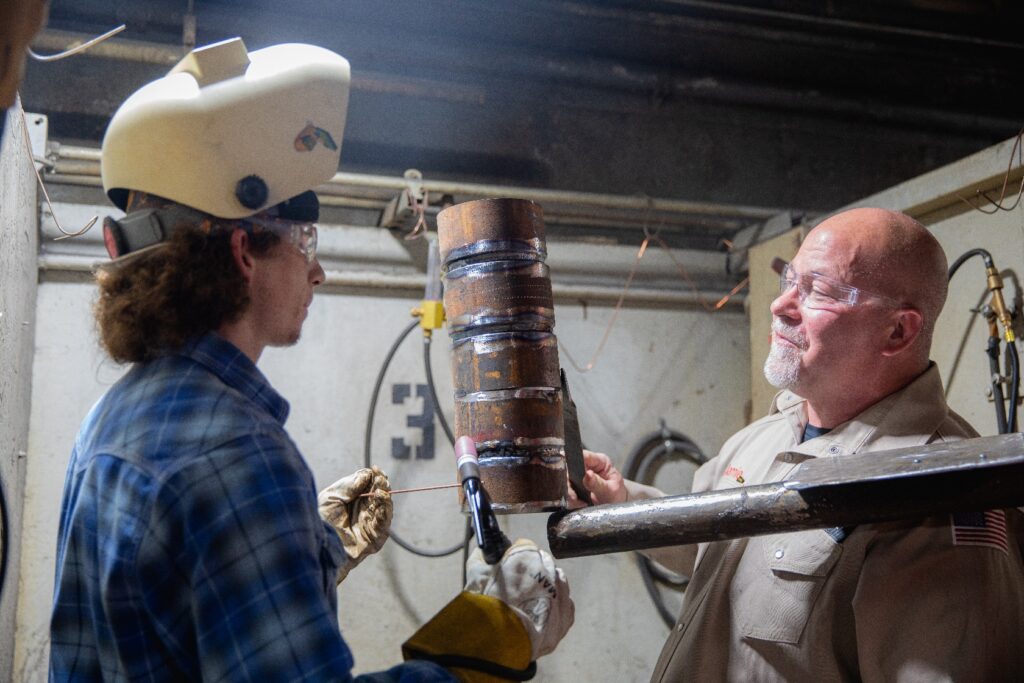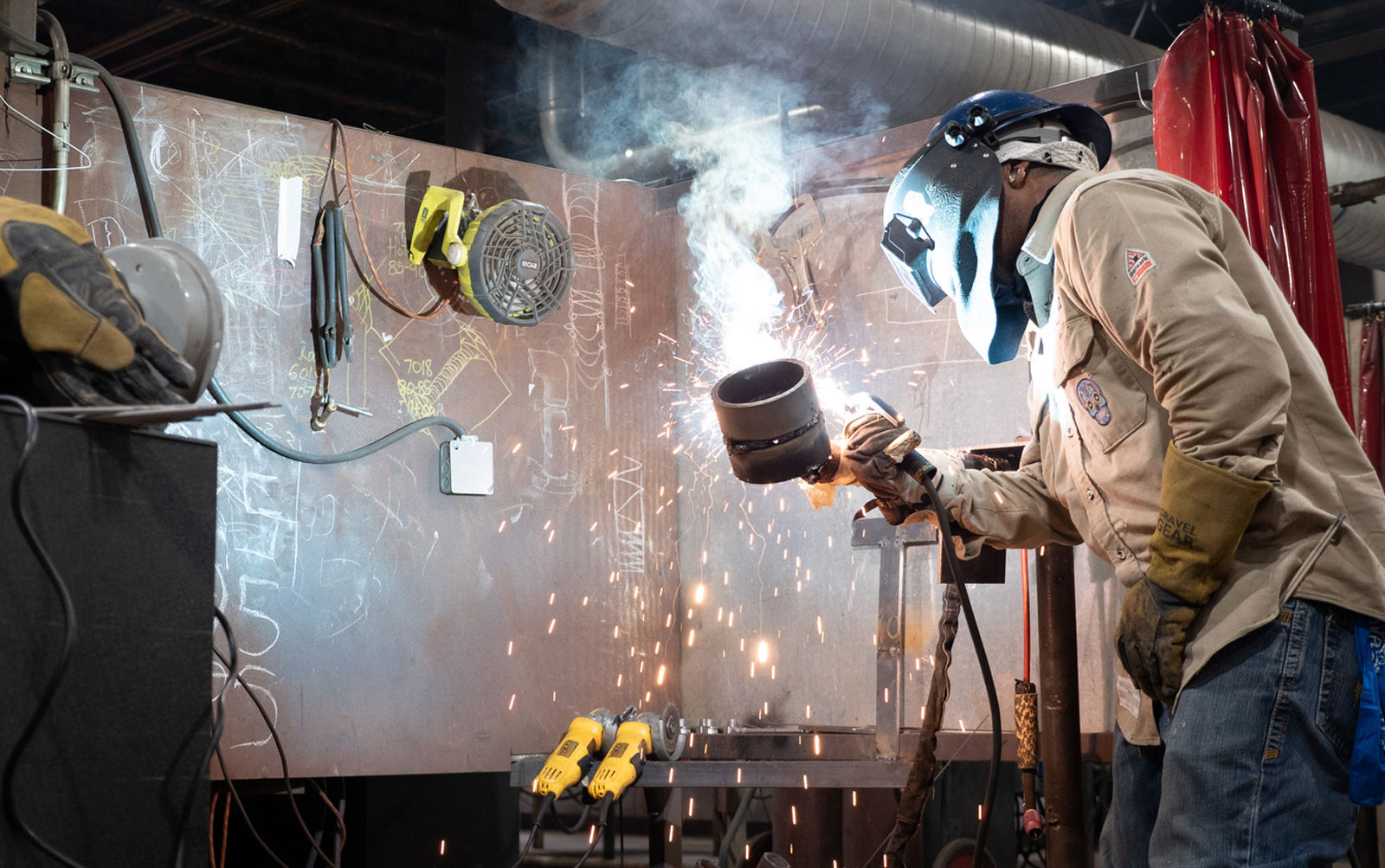Duration:
14 months
Campus Availability:
- Tulsa, OK
- Jacksonville, FL
- Houston, TX
- Dallas Metro (Irving), TX
Upcoming Start Dates:
Aug. 11, 2025 & Sep. 2, 2025
START TRAINING FOR YOUR WELDING CAREER TODAY
The Associates of Occupational Studies (AOS) in Welding Technology degree program is the key for Professional Welder program graduates who want to take their welding skills to the next level, training them in non-destructive testing techniques, metallurgy, codes and welding inspector quality control and assurance.
This degree program unlocks the door to not only more welding knowhow, but also more career opportunities. The AOS in Welding Technology degree program can be completed in just 14 months total (7 months of the Professional Welder program + 7 additional months of upper division AOS courses).
Program Overview at TWS
The AOS in Welding Technology degree program can be completed in as few as 14 months. It consists of the 7-month Professional Welder program, plus even more in-depth welding instruction. Available at our Tulsa, OK, and Jacksonville, FL campuses, this program opens the path to career opportunities as a welding quality assurance/quality control welding inspector.
Employment is Expected to Grow for Welding in the US by 45,800 Jobs by 2033!i
Flexible Class Schedules
Morning, Afternoon and Evening Classes Available

Class schedules range from morning, afternoon and evening, depending on the program and campus location. TWS offers flexible schedules whether you are just graduating from high school, changing your career, or transitioning from military to civilian life. We work hard to find the right program and the right schedule to help you succeed. Contact us for more information on upcoming class times and start dates for the Associate of Occupational Studies in Welding Technology program.

Experiences & Opportunities
Resources for TWS Students
Virtual Tour
Take a virtual tour of our campuses! Explore the classrooms, labs and shop floor with our unique interactive experience.
Employer Relationships
TWS has relationships with major employers across the United States. Our dedicated Career Services team will be there to support you every step of the way after graduation.
The Right Tools for the Job
When you begin your education at TWS, we provide you with an extensive gear package. You get the high quality professional tools you need to succeed. Ask your Admissions Representative for more information about the gear package for your program.
Scholarship Opportunities
Learn more about what scholarship opportunities are available and how you might qualify for one. Start the process of applying for a scholarship today!
Associate of Occupational Studies in Welding Technology Class Start Dates
Class Schedules (Mon - Thu)
- Morning 7:30am-12:30pm
- Afternoon 1:00pm-6:00pm
- Evening 6:30pm-11:30pm

HYBRID INSTRUCTION
At TWS, we know you’re here to build real-world skills, not spend endless hours in a classroom. That’s why we offer a flexible online hybrid model, allowing you to complete the theoretical parts of your program online, as long as it’s done by the deadline. When you’re on campus, your time is spent where it counts: hands-on in the lab with tools, equipment, and expert instructors.
This approach gives you the freedom to balance school with other responsibilities, while still getting the hands-on training you need for a successful career in the skilled trades.

Ready to Move Forward?
All it takes to move forward is making that first step. Whether you need more information, schedule a tour or want to speak to someone, we’re with you every step of the way.
Are YOU ready to change your life?
Listen to these TWS graduates who changed theirs.
We all come from different walks of life, and different circumstances, but it’s the hard work we do and the blood sweat and tears put in to make us who we are today.
Tulsa Welding School gave these graduates the structure, confidence, and guidance they needed to make a difference in their lives. It only takes one decision to start the journey on a path towards a better career. A better Life.
Hear the stories of these TWS graduates and how they changed their lives:
Geicil - Welding Graduate
After moving to the U.S. from the Philippines and starting a family, Geicil knew it was time to pursue a career that could provide the future they all deserved. When her husband told her about Tulsa Welding School, she took the leap. She graduated in just seven months and landed a welding job shortly after graduation. Today, she’s a high-frequency TIG welder doing work for the U.S. Navy, a mission close to her heart with her stepson serving. She’s proud of how far she’s come and hopes her story inspires others to work hard and aim high. Hear her story on how TWS changed her life.
Michael - HVAC/R Graduate
Growing up in 1980s–90s Los Angeles, Michael faced the daily pressures of gangs and drugs. After asking himself, “Would my father be proud of the man I am today?” he realized it was time for change. While working in a warehouse, a chance moment with an HVAC technician sparked a new path, and he enrolled at Tulsa Welding School. After graduating and working as an HVAC/R tech, Michael earned his contractor’s license and eventually launched his own business. Today, Michael enjoys traveling with his son to BMX competitions and living life on his own terms. He calls TWS the launchpad for the incredible journey he’s on now. Hear his story on how TWS changed his life.
Kathryn - Electrical Graduate
As a single mother, Kathryn knew finding a work/life balance wouldn’t be easy, but she refused to settle. Despite skepticism from others, Kathryn enrolled at Tulsa Welding School to pivot away from another career that wasn’t fulfilling. The flexible schedule made it possible, and before even graduating, she landed a job offer. Today, she’s thriving in a role where she feels valued and finally has the balance to be fully present for her daughter. Kathryn credits TWS for helping her reclaim her future on her own terms. Hear her story on how TWS changed her life.

Program Courses for Associate of Occupational Studies in Welding Technology
Prerequisite Courses
This program requires completion of the Professional Welding Training program prior to enrolling.
Click here for the Professional Welding Training class descriptions.
Sound Interesting? Contact us for more information on this course and the Professional Welding Training program below.
Codes & Specifications Radiographic Film Interpretation
Phase 202
Students will learn coverage and applications of codes and specifications from various professional societies, institutes and associations that issue standards for metal fabrication.
Lab activities are associated with the utilization of these standards and radiographic film interpretation.
Requirements
- 2.5 Semester Credit Hours
- 50 Lecture Hours
- 10 Lab Hours
- 60 Total Contact Hours
Drawings & Fabrication Processes
Phase 204
Students will learn to analyze fabrication drawings, bills of materials, product dimensional tolerance standards, and specified fabrication processes.
Lab activities reinforce the lecture information.
Requirements
- 3 Semester Credit Hours
- 55 Lecture Hours
- 5 Lab Hours
- 60 Total Contact Hours
- 40 Outside Prep Hours
Visual & Leak Testing
Phase 205
Presentation of the oldest and most widely used method of Nondestructive Testing (NDT) which is visual inspection of welds and other specifications.
Perform leak testing procedures according to ANSI and ASME specifications. Lab provides practice on these NDT competencies.
Requirements
- 3 Semester Credit Hours
- 50 Lecture Hours
- 10 Lab Hours
- 60 Total Contact Hours
- 40 Outside Prep Hours
Liquid Penetrant & Magnetic Particle Testing
Phase 206
Students will learn the methods of PT testing to detect surface defects on non-porous solid material.
Techniques and methods such as penetrant techniques, safety, and environmental considerations, along with the magnetic particle test method and its value for inspecting ferromagnetic materials will be discussed. Wet fluorescent magnetic particle testing method is included.
Lab applications will reinforce associated theory.
Requirements
- 2.5 Semester Credit Hours
- 50 Lecture Hours
- 10 Lab Hours
- 60 Total Contact Hours
- 10 Outside Prep Hours
Radiographic Testing Radiation Safety
Phase 207
Students will learn the theory and applications for the use of radiographic testing.
In addition, students will learn the safety requirements for radiation environments.
Requirements
- 2.5 Semester Credit Hours
- 50 Lecture Hours
- 10 Lab Hours
- 60 Total Contact Hours
- 10 Outside Prep Hours
Eddy Current Testing
Phase 208
Students will learn the NDT theory and techniques of eddy current testing processes.
Lab assignments implement these various testing methods.
Requirements
- 2.5 Semester Credit Hours
- 50 Lecture Hours
- 10 Lab Hours
- 60 Total Contact Hours
- 10 Outside Prep Hours
Ultrasonic Testing
Phase 209
Students will learn the acoustic relationships and physical principles associated with ultrasonic testing techniques.
Lab applications reinforce the theory supporting this important process.
Requirements
- 3 Semester Credit Hours
- 50 Lecture Hours
- 10 Lab Hours
- 60 Total Contact Hours
- 40 Outside Prep Hours
Quality Management Techniques
Phase 211
Students will learn the roles of the welding quality assurance/quality control inspector.
Basics of total quality managements and statistical control will also be discussed.
Requirements
- 3 Semester Credit Hours
- 60 Lecture Hours
- 60 Total Contact Hours
- 30 Outside Prep Hours
Fine Art & History of Metal Work
HUM201
Students will learn about the evolution of welding and metalwork and discover the artistry of metalwork including welding.
Requirements
- 2 Semester Credit Hours
- 40 Lecture Hours
- 40 Total Contact Hours
Communications & Records
Phase 203
Students will learn the techniques and approaches to effectively communicate with various personalities in the workplace.
Students will also learn the documentation of inspection results, filing systems, and maintenance of activity reports.
Requirements
- 3 Semester Credit Hours
- 60 Lecture Hours
- 60 Total Contact Hours
- 40 Outside Prep Hours
Basic Metallurgy & Destructive Testing
Phase 210
Students will learn the fundamentals of metal structure and properties.
Students will learn how to test through destructive methods of cutting weld straps and checking tensile strength as well as any defects.
Lab focus is on destructive testing applications.
Requirements
- 3 Semester Credit Hours
- 50 Lecture Hours
- 10 Lab Hours
- 60 Total Contact Hours
- 40 Outside Prep Hours
Computer Applications and Decision Making
Phase 214
This course covers the fundamentals, components and operations of computers and computer systems.
Included is an introduction to computer basics, computer components and operations, hardware configuration and software applications. Also covered are a demonstration and application of miscellaneous software relating to the industry. This course emphasizes the concept that service is produced and consumed simultaneously, and addresses communications and active listening methods to ensure this transaction is profitable and positive.
Includes servicing techniques in dealing with customers in a positive manner.
Requirements
- 2 Semester Credit Hours
- 50 Lecture Hours
- 50 Total Contact Hours
- 12 Outside Prep Hours
Basic College Mathematics
BCM100
This course presents the fundamental concepts of a pre-algebra course.
Students will be introduced to whole numbers, fractions and decimals, integers, order of operations, percents, signed numbers, measurements, geometry, probability, and basic algebra concepts.
This course is available via online courses only and is taken in tandem with other courses and does not add weeks to the total program length.
Requirements
- 3 Semester Credit Hours
- 45 Lecture Hours
- 45 Total Contact Hours
- 112 Outside Prep Hours


ALL New Welding Students Get an Oculus Quest 2 loaded with OcuWeld Training Software!
TWS is excited to launch OcuWeld utilizing Virtual Reality (VR) to enhance your welding training. OcuWeld is a new and innovative Virtual Reality (VR) welding simulator designed by expert welding instructors for our welding students.
You can access OcuWeld anytime, anywhere – with or without WIFI. It enables you to practice your welding skills as part of our program here at TWS and the Oculus Quest 2 is yours to keep!
Student Reviews
Adonis Lenington

